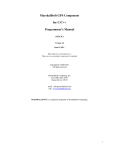Download AES_4C - MarshallSoft Computing
Transcript
MarshallSoft AES
(Advanced Encryption Standard)
Library for C/C++
Programmer's Manual
(AES_4C)
Version 3.0
May 6, 2015
This software is provided as-is.
There are no warranties, expressed or implied.
Copyright (C) 2015
All rights reserved
MarshallSoft Computing, Inc.
Post Office Box 4543
Huntsville AL 35815
Voice: 1.256.881.4630
Web: http://www.marshallsoft.com
MARSHALLSOFT is a registered trademark of MarshallSoft Computing.
1
TABLE OF CONTENTS
1 Introduction
1.1 Features
1.2 Documentation Set
1.3 Example Program
1.4 Installation
1.5 Uninstalling
1.6 Pricing
1.7 Updates
2 MarshallSoft AES Library Overview
2.1 Dynamic Link Library
2.2 Keycode
2.3 Win32 STDCALL and DECLSPEC
2.4 Console Mode
2.5 Static Linking
2.6 Calling AES from C++
2.7 Adding AES to an Existing Program
2.8 Error Display
2.9 Explicitly Loading a AES DLL
2.10 Targeting a 64-Bit CPU
2.11 64-Bit AES
3 Compiler Issues
3.1 Compiling Using an IDE
3.2 Command Line Tool Setup
3.3 Command Line Batch Files
3.4 Command Line Makefiles
4 Supported Compilers
4.1 Microsoft Visual C++
4.2 Microsoft Visual Studio C++
4.3 Microsoft Visual Studio C#
4.4 Borland C/C++
4.5 Turbo C/C++ for Windows
4.6 Borland C++ Builder
4.7 Watcom C/C++
4.8 LCC-Win32 C
4.9 MinGW C/C++
4.10 Digital Mars C/C++
5 Compiling Programs
5.1 Compiling AES Source Code
5.2 Compiling Example Programs
6 Example Programs
7 Revision History
Page
Page
Page
Page
Page
Page
Page
Page
Page
Page
Page
Page
Page
Page
Page
Page
Page
Page
Page
Page
Page
Page
Page
Page
Page
Page
Page
Page
Page
Page
Page
Page
Page
Page
Page
Page
Page
Page
Page
Page
Page
3
4
5
5
6
6
6
6
7
7
7
7
8
8
8
8
9
9
10
11
11
11
12
13
13
14
14
16
17
18
18
19
19
20
20
20
19
19
20
22
24
2
1 Introduction
The MarshallSoft Advanced Encryption Standard Library for C/C++ (AES4C) is a toolkit that allows
software developers to easily implement strong encryption and decryption into a Windows C/C++, Visual
C++, .NET or Visual C# application.
The MarshallSoft Advanced Encryption Standard Library (MarshallSoft AES) is a component (DLL)
library of functions used to perform encryption and decryption using the 256-bit "Advanced Encryption
Standard" (AES) as specified by the U.S. National Institute of Standards and Technology (NIST). See
http://csrc.nist.gov/publications/fips/fips197/fips-197.pdf
AES is considered "strong encryption" and replaces the previous U.S. encryption standard "Data
Encryption Standard" (DES). AES is commonly used by many financial entities such as banks to protect
their customer's sensitive information.
Our implementation of the Advanced Encryption Standard (AES) has been verified by running the
"Advanced Encryption Standard Algorithm Validation Suite" (AESAVS), which can be found at
http://csrc.nist.gov/groups/STM/cavp/documents/aes/AESAVS.pdf.
This MarshallSoft Advanced Encryption Standard Programmers Manual for C/C++ provides
information need to compile and run programs in a C/C++ programming environment.
The MarshallSoft Advanced Encryption Standard DLL's will work under all versions of Windows
(2003-2012/XP/Vista/ Windows7/Windows 8). Both Win32 and Win64 DLL's are included.
AES4C includes several C/C++ example programs, including Visual Studio C++ and Visual Studio, which
demonstrate AES encryption and decryption. Borland C++ Builder (BCB) examples are also provided.
The MarshallSoft Advanced Encryption Standard Library for C/C++ component library supports and
has been tested with C/C++, Microsoft Visual C++, Visual Studio .NET Framework (Visual C++ .NET,
C# .NET), Visual C++ Express, Borland C/C++, Borland Turbo C++ for Windows, Borland C++ Builder,
Watcom C/C++, LCC-Win32, and MinGW C compilers. AES4C can also be used with most other
C/C++ Windows compilers.
The MarshallSoft AES DLLs (aes32.dll and AES64.DLL) can also be used from any language (Visual
Basic, VB.NET, ACCESS, EXCEL, VBA, Borland Delphi, Visual FoxPro, COBOL, Xbase++, Visual
dBase, Microsoft Office, etc.) capable of calling the Windows API.
For the latest version of the MarshallSoft AES software, see
http:/www.marshallsoft.com/aes4c.htm
Legalities
It is illegal to possess strong encryption software in some countries in the world. Do not download or use
this software if it is illegal to do so in your country.
In addition, this software cannot be sold to countries on the U.S. Embargo List. See
http://www.pmddtc.state.gov/embargoed_countries/index.html
3
1.1 Features
Some of the many features of the MarshallSoft Advanced Encryption Standard Library for C/C++ are
as follows:
Supports both 32-bit and 64-bit Windows.
Implements the 256-bit "Advanced Encryption Standard" (Rijndael)
Supports ECB (Electronic Cookbook) mode.
Supports CBC (Cipher Block Chaining) mode.
Supports PKCS7 padding.
Free technical support and updates for one year.
License covers all programming languages.
Royalty free distribution with a compiled application.
Evaluation versions are fully functional. (30 day trial). No unlock code is required.
Can be used from GUI mode or console mode programs.
Is fully thread safe.
Supports Windows 2003-2012/XP/Vista/Window 7/Windows 8.
Implemented as a standard Windows DLL, which will work with all versions of Windows.
Both Win32 and Win64 DLLs are included.
Is native Windows code but can also be called from managed code.
Will run on machines with or without .NET installed.
Works with all versions of Microsoft Visual C/C++ (v4.0 through Visual Studio 2013).
Works with Microsoft Visual Studio .NET and Visual C#.
Works with Borland C/C++ (v5.0, v5.5, and Borland C++ Builder [all versions]).
Works with Microsoft Foundation Class, Watcom v11, MinGW, Digital Mars and LCC-WIN32.
Does not depend on support libraries. Makes calls to core Windows API functions only.
Can be used with any program (in any language) capable of calling Windows API functions such as
Visual Basic, VB.NET, Visual FoxPro, Delphi, Xbase++, dBASE, COBOL, Access or Excel.
Can be purchased with (or without) source code.
Updates are free for one year (source code updates are separate).
Unlimited one-year email and phone tech support.
Documentation online as well as in printable format.
A selection of C/C++ example programs with full source code is included. Refer to Section 6 for more
details on each of the example programs.
Legend:
Con = Console mode.
GUI = GUI mode.
VC = VC 4 thru 6.
VS = Visual Studio C/C++
VC/B/L/G/D = For VC 4 thru 6, Borland 5.0 thru 5.5, LCC, MinGW GCC, Digital Mars
1.
2.
3.
4.
5.
6.
6.
7.
8.
9.
10.
aesver.c
crypto.c
decrypt.c
encrypt.c
TestAES.c
Password.c
vc_Crypto.cpp
vc_TestAES.cpp
vc_vers.cpp
vc_Password.cpp
aesver.cs
Displays AES4C version (CON, VC/B/L/G)
Encrypts/decrypts a file (GUI, VC/B/L/G)
Decrypts a file (CON, VC/B/L/G)
Encrypts a file (CON, VC/B/L/G)
Performs AES tests (CON, VC/B/L/G)
Encrypt/decrypt multiple passwords (GUI, VC/B/L/G)
Encrypts/decrypts a file (VS, GUI)
Performs AES tests (VS, CON)
Displays AES version (VS, CON)
Encrypt/decrypt multiple passwords (VS, GUI)
C# version of vc_aesver (VS, C#)
4
1.2 Documentation Set
The complete set of documentation is provided in Adobe PDF format. This is the first manual
(AES_4C.PDF) in the set.
AES_4C Programmer’s Manual (AES_4C.PDF)
AES User’s Manual (AES_USR.PDF)
AES Reference Manual (AES_REF.PDF)
The AES_4C Programmer’s Manual (AES_4C.PDF) is the language specific (C/C++) manual and
provides information needed to install and compile example programs in a C/C++ environment.
The AES User’s Manual (AES_USR.PDF) discusses language independent issues. Information
encryption/decryption programming issues as well as technical support, purchasing and license
information is provided in the manual.
The AES Reference Manual (AES_REF.PDF) contains details on each individual AES function.
Documentation is also provided online at http:/www.marshallsoft.com/aes4c.htm
1.3 Example Program
The following example demonstrates some of the library functions.
#include "aes.h"
int EncryptFile(char *KeyBuffer, char *FileName)
{int Code;
// attach DLL
Code = aesAttach(AES_KEY_CODE, AES_PKCS7_MASK);
if(Code<0)
{printf("ERROR %d: Cannot attach\n", Code);
return FALSE;
}
printf("Will encrypt file in ECB (Electronic Code Book) mode\n");
Code = aesInitAES((char *)KeyBuffer, NULL, AES_ECB_MODE, AES_ENCRYPT, NULL);
if(Code<0)
{printf("aesInitAES fails\n");
PrintError(Code);
return FALSE;
}
printf("Encrypt file...\n");
Code = aesEncryptFile(NULL, KeyBuffer, FileName);
if(Code<0)
{printf("aesEncryptFile fails\n");
PrintError(Code);
return FALSE;
}
printf("%d bytes encrypted\n", Code);
return Code;
}
5
1.4 Installation
(1) Before installation of AES4C, a Windows C/C++ compiler should already be installed and tested. In
particular, include command line tools when installing a compiler to be able to compile using command
line makefiles. Refer to the file, MAKEFILE.TXT, for help with makefiles.
(2) Unzip AES4C30.ZIP (evaluation version) or AESxxxxx.ZIP (registered version: xxxxx is the
Customer ID).
(3) Run the installation program SETUP.EXE that will install all AES4C files. SETUP will also copy
AES32.dll and AES64.DLL to the Windows directory. Note that no DLL registration is required.
All recent WIN32 C/C++ compilers support the "declspec" keyword. Microsoft Visual C++ (version 4.0
and up), Borland (version 5.0 and up), and LCC-Win32 compilers support the "declspec" keyword.
Makefiles for Watcom (version 11.0 and up) are available on request.
1.5 Uninstalling
Uninstalling AES4C is very easy. First, delete the AES project directory created when installing AES4C.
Second, delete AES32.dll and AES64.DLL from the Windows directory, typically C:\WINDOWS for
Windows /XP/2003-2012/Vista/Win7/Win8.
1.6 Pricing
A developer license for the MarshallSoft Advanced Encryption Standard Library can be purchased for
$115 (or $195 with source code to the library DLL). Purchasing details can be found in Section _1.4,
"How to Purchase", of the AES User’s Manual (AES_USR).
Also see INVOICE.TXT or http://www.marshallsoft.com/order.htm
1.7 Updates
When a developer license is purchased for AES, the developer will be sent a set of registered DLLs plus a
license file (AESxxxxx.LIC). The license file can be used to update the registered DLL for a period of one
year from purchase. Updates can be downloaded from
http://www.marshallsoft.com/update.htm
After one year, the developer license must be updated to be able to download updates. The license can be
updated for
$30 if the update is ordered within one year of the original purchase (or previous update).
$55 if the update is ordered between one and three years of the original purchase (or previous
update).
$75 if the update is ordered after three years of the original purchase (or previous update). .
The update price includes technical support for an additional year. Note that the registered DLLs, (AES32.
DLL and AES64.DLL) never expire. If source code was previously purchased, updates to the source code
can be purchased for $40 along with the license update.
6
2 AES Library Overview
The MarshallSoft Advanced Encryption Standard Library for C/C++ (AES4C) has been tested on
multiple computers running Windows 2003-2012/XP/Vista/ Windows 7/Windows 8.
The AES4C library has been tested with several C/C++ compilers, including Microsoft Visual C++ (all
versions including Visual Studio .NET and Visual Studio C#), Borland C/C++, Borland C++ Builder,
Turbo C/C++ for Windows, Watcom C/C++, Digital Mars, MinGW C++ and LCC-Win32 C
The SETUP installation program will copy the Lib’s and DLL to the Windows directory. Refer to Section
1.4 "Installation". After SETUP is run, the AES4C files are copied to the directory specified (default
\AES4C). Three sub-directories are created, as follows:
DOCS – All documentation files
APPS – All example code
DLLS – All DLL’s
2.1 Dynamic Link Library
The MarshallSoft Advanced Encryption Standard Library is implemented as Win32 and Win64
dynamic link libraries (DLL). A DLL is characterized by the fact that it need not be loaded until required
by an application program and that only one copy of the DLL is necessary regardless of the number of
application programs that use it. Contrast this to the traditional static library that is bound to each and
every application that uses it at link time.
An important advantage that DLL's have over other "popular" library formats such as VBX or OCX is that
DLL's are callable by all Windows applications. Since DLL's are the building blocks of the Windows
Operating System, they will not be replaced by a "newer technology".
The following files can be found in the DLL sub-directory when SETUP is run:
AES32.dll
AES64.dll
- Win32 version of AES
- Win64 version of AES
Note: The LIB files for the above DLLs can be found the in the APPS directory
2.2 Keycode
The AES DLLs, AES32.dll and AES64.DLL, each have a keycode encoded within them. The keycode is a
9 or 10-digit decimal number (unless it is 0), and will be found in the file KEYCODE.H. The keycode for
the evaluation version is 0. The developer will receive a new key code after registering. The KEYCODE
is passed to aesAttach.
If an error code (a negative number) is returned when calling aesAttach, it means that the keycode in the
AES application does not match the keycode in the DLL (error -202), or that the evaluation version has
expired (error -203).
2.3 Win32 STDCALL and DECLSPEC
AES32 is compiled using the _stdcall and _declspec keywords. This means that AES4C uses the same
calling conventions and file naming conventions as the Win32 API. In particular, function names are NOT
decorated. There are no leading underscores or trailing "@size" strings added to function names.
Microsoft Visual C++ users can look at the AES32 function names using the dumpbin.exe executable:
dumpbin /exports AES32.dll
7
2.4 Console Mode
AES4C functions can be called from Win32/Win64 console mode programs. A "console mode" program
is a Windows XP/Vista/ Windows 7/Windows 8 command line program running in a command window.
Although console mode programs look like DOS programs, they are Win32/Win64 programs that have
access to the Win32/Win64 API and the entire Windows address space. Programming using console mode
programs reduces the complexity of using GUI code. All console mode programs can be converted to GUI
mode by adding the necessary Windows interface code.
2.5 Static Linking
The registered user can also statically link aes32.obj (or aes64.obj) with their application, rather than
making calls to the DLL's.
For example, to create an application that links aes32.obj statically:
(1) All application code that includes AES.H must define STATIC_LIBRARY before including AES.H
If using Microsoft Developer Studio, make these changes:
(1) To the project file: Do not add aes32.lib to the project file.
(2) To the settings: (See "Build Settings" or "Project/Settings")
(2a) C/C++ Tab: Add STATIC_LIBRARY to "preprocessor definitions:”
(2b) Link Tab: Add AES32.obj to "object/library modules:"
(3) Add #include "aes.h" to all source files that make calls to AES functions.
Alternatively, AES32.C can be edited so that it can be compiled and linked like any other program file. In
order to do this, remove all code from AES32.C (provided when the source code is purchased) from
#ifndef STATIC_LIBRARY
through the following
#endif
2.6 Calling MarshallSoft AES from C++
Like Windows itself, MarshallSoft AES functions are coded in ANSI C, but AES functions can be called
directly from both ANSI C programs and from C++ programs.
2.7 Adding MarshallSoft AES to an Existing Program
In order to call AES functions from an existing program,
(1) Add
#include "AES.H"
to the application source code,
(2) Link with aes32.lib (for MSVC), aes32bc5.lib (Borland C/C++ and C++ Builder), aes32.lib (Watcom),
or aes32lcc.lib (Win32/LCC), and recompile from source.
For Win64, link with aes64.lib rather than aes32.lib
8
2.8 Error Display
The error message text associated with AES error codes can be displayed by calling aesErrorText. For
example, if ‘ErrCode’ is returned by a AES function and it is negative (indicating an error), the text
associated with the error code can be found by calling aesErrorText, as demonstrated by the following
code segment:
void DisplayError(int ErrCode, char *MsgPtr)
{int Len;
char ErrBuff[128];
printf("ERROR %d: ", ErrCode);
if(MsgPtr) printf("%s: ", MsgPtr);
Len = aesErrorText(ErrCode, (char *)ErrBuff, 127);
if(Len>0) printf("%s\n", ErrBuff);
else printf("\n");
}
2.9 Explicitly Loading an AES DLL
When an application program runs that makes calls to AES32.dll (or AES64.DLL), the Windows operating
system will locate AES32.dll (or AES64.DLL) by searching the directories as specified by the Windows
search path. If the AES DLL is placed in the \WINDOWS, it will always be found by Windows.
However, AES32.dll (or AES64.DLL) can also be loaded from a specified directory by using the
GetProcAddress Win32 API function. For an example, refer to the LoadLib.c program.
9
2.10 Targeting a 64-Bit CPU
If a compiler generates 32-bit application code and is running on a 64-bit version of Windows, then
compiling and linking is the same as it were on a 32-bit Windows system. The 32-bit application code
generated will be executed by the Windows WOW64 (Windows on Windows 64-bit) component.
If a compiler generates 64-bit application code and is running on a 64-bit version of Windows, then the
compiler must be reconfigured to generate 32-bit application code if the application will call 32-bit DLL's
such as aes32.dll. The 32-bit application code generated will be executed by the Windows WOW64
(Windows on Windows 64-bit) component.
2.10.1 Visual Studio C/C++: Versions 2005 through 2013
With a project selected in Solution Explorer, on the Project menu, click Properties.
Click the "Configuration Manager" button in upper right corner.
Click the drop-down button below "Platform".
Click <New...>, then choose "x86" (Win32).
2.10.2 Visual Studio Visual Basic: Versions 2005 through 2013
With a project selected in Solution Explorer, on the Project menu, click Properties.
Click "Build", then "Configuration Manager".
Click the drop-down button below "Active Solution Platform".
Click <New...>, then change "Any CPU" to "x86".
2.11 64-bit AES
64-bit DLL's may only be used by 64-bit application programs running on 64-bit Windows computers.
This means that 64-bit application programs must be linked with aes64.lib instead of aes32.lib.
However, if a compiler generates 32-bit code, the application must be linked with aes32.lib even though it
may be running on a 64-bit machine.
There are numerous AES4C 64-bit example programs. 64-bit Visual Studio 2008, 2010, 2012, and 2013
Visual Studio project files can be found in the APPS sub-directory:
vc_Crypto(VS2008)x64.vcproj
vc_TesAES(VS2008)64.vcproj
vc_vers(VS2008)x64.vcproj
vc_Crypto(VS2010)x64.vcproj
vc_TesAES(VS2010)x64.vcproj
vc_vers(VS2010)x64.vcproj
vc_Crypto(VS2012)x64.vcproj
vc_TesAES(VS2012)64.vcproj
vc_vers(VS2012)x64.vcproj
vc_Crypto(VS2013)x64.vcproj
vc_TesAES(VS2013)x64.vcproj
vc_vers(VS2013)x64.vcproj
10
3 Compiler Issues
AES programs can be compiled using an IDE or command line compiler tools. The following sections
provide general compiler information.
3.1 Compiling Using an IDE
All current windows compilers have an "Integrated Development Environment" (IDE) for building
application programs in the Windows environment.
Note that not only do IDE's vary between the different compiler manufacturers, but they also vary from
version to version for the same compiler.
3.1.1 Compiling Example Programs with an IDE
Most of the example programs can be compiled from the compiler's IDE. For Visual C/C++, "project
makefiles" are used since they can be used by all versions of Microsoft Visual C++. When opening the
workspace, select "makefiles(.mak)" for the file type.
Alternatively, for Visual C++ v6.0, select "projects (.dsp)" for the file type.
3.1.2 Compiling New Projects with an IDE
All of the IDE's use the concept of a file hierarchy. For example, the AESVER example program files
hierarchy in the IDE (for 32-bit) should look like:
aesver.exe
+++ aesver.c
+++ aes32.lib
Replace aes32.lib with aes32bc5.lib if using Borland C++ Builder, and with aes32lcc.lib if using LCCWin32.
The order of the files is not significant. Refer to Section 4 below for a particular IDE.
11
3.2 Command Line Tool Setup
Many software developers overlook the power of using command line compilers. There are a number of
very significant advantages to using the command line version of a C/C++ compiler. Among these are:
Easy of Use: Once set up, typing a single key can compile one or a thousand programs.
Power: Using the command line allows the use of batch files, automating complicated builds.
Compatibility: Command line makefiles (unlike IDE project files) are normally compatible from one
version of a compiler to the next.
In order to compile from the command line, command line compiler tools must be set up properly. Note
that an option to install command line tools (or not to install them) is provided during installation of a
C/C++ compiler. Refer to the compiler manufacturer's manual for details.
If necessary, the size of the environment table space can be increased by adding
SHELL=C:\COMMAND.COM /e:1024 /p
to CONFIG.SYS in C:\ and then reboot. Yes, this works for all versions of Windows, including Windows
NT, 2000, Windows 8, Windows 7, Vista and XP
For all compilers, the path should point to the compiler's BIN directory. For example, to add
"C:\BC50\BIN" to an existing path, use
PATH C:\BC50\BIN;%PATH%
3.2.1 Microsoft Visual C++
Set LIB and INCLUDE environment variables. For example,
SET INCLUDE=C:\MSVC\INCLUDE
SET LIB=C:\MSVC\LIB
3.2.2 Borland
Check that TURBOC.CFG, BCC32.CFG, TLINK.CFG, and TLINK32.CFG all have the correct
information in them, as they should have when the compiler was installed. For example,
-IC:\BC5\INCLUDE
-LC:\BC5\LIB
BRCC (the Borland Resource Compiler) doesn't use the *.CFG files. Set the INCLUDE environment
variable or BRCC will not be able to find the INCLUDE files (such as WINDOWS.H). For example,
SET INCLUDE=C:\BC5\INCLUDE
Clear the LIB environment variable (so it is not present when SET is typed at the command line) with
SET LIB=
12
3.2.3 Watcom
Set the WATCOM environment variables to point to the compilers include (H) and BIN directories. For
example,
SET INCLUDE=C:\WC11\H;C:\WC11\H\NT
SET WATCOM=C:\WC11
SET EDPATH=C:\WC11\EDDAT
SET WWINHELP=E:\BINW
Watcom makefiles are available on request.
3.2.4 LCC (32-bit or 64-bit)
The LCC environment variables are set like the others. For example,
SET INCLUDE=C:\LCC\INCLUDE
SET LIB=C:\LCC\LIB
After making the above changes for the compiler, type PATH at the command line prompt to verify the
search path, and type SET at the command line prompt to verify the INCLUDE and LIB environment
variables.
3.3 Command Line Batch Files
If the compiler installation includes command line tools, then all of the example programs can be compiled
directly from the command line. These same compiler commands can also be placed in a batch file.
See AESVER$LCC.BAT for an example of a command line batch file for LCC-Win32. Similarly,
command line batch files can be created for all of the example programs.
3.4 Command Line Makefiles
Command line makefiles originated on UNIX systems. They are the standard way that C/C++ programs
are constructed in command line environments. The advantage of makefiles (as compared to an integrated
development environment) is that all compiler switches are always coded within the makefile and the
makefile can be run with a single keystroke.
Command line makefiles are provided for Microsoft, Borland, Watcom, and LCC command line
compilers. They can be found in the \APPS sub-directory created when SETUP was run
makefiles(borland50).zip
makefiles(borland55).zip
makefiles(lcc).zip
makefiles(microsoft).zip
makefiles(watcom11).zip
makefiles(gcc).zip
makefiles(mars).zip
Borland C/C++ 5.0 makefiles.
Borland C/C++ 5.5 makefiles.
LCC project command files.
Microsoft C/C++ makefiles.
Watcom C/C++ 11 makefiles.
MinGW GCC project build files.
Digital Mars project build files.
13
4.0 Supported Compilers
The MarshallSoft AES Library for C/C++ (AES4C) has been tested with and works with all versions of
the following compilers:
Microsoft Visual C/C++ (1.52 through 11.00)
Visual C++ .Net through Visual Studio 2013
Visual C#,
Borland C/C++
Borland/Embarcadero C++ Builder
Borland Turbo C/C++
Watcom C/C++
MinGW C++
LCC
Digital Mars.
Other Windows C/C++ compilers may work as well. Refer also to Section 5, "Compiling Example
Programs".
4.1 Microsoft Visual C/C++ (VC 4.0 through 6.0)
Microsoft Visual C++ programs can be compiled from either the command line or from within the
Microsoft development environment.
The last Win16 Microsoft compiler is version 1.52. All Microsoft Visual C++ compilers (version 4.0
through 6.0 ) compile Win32 programs ONLY. AES does not support Win16.
Visual C/C++ project files use file extension ".mak". Visual C/C++ 6.0 project files use file extension
“.dsp"
Visual C/C++ makefiles use file extension "._M_" and are contained in the file makefiles(microsoft).zip.
4.2 Microsoft Visual Studio C/C++
AES4C works with all versions of Visual Studio
4.2.1 Microsoft Visual Studio C/C++ 2003 and 2005
Visual Studio 2003 through 2005 project files use file extension ".vcproj"
4.2.2 Microsoft Visual Studio C/C++ 2008
Visual Studio 2008 specific project files end with “.(VS2008).vcproj” for 32-bit applications and
“.(VS2008)x64.vcproj” for 64-bit applications. Visual Studio 2008 can compile both 32-bit and 64-bit
programs.
4.2.3 Microsoft Visual Studio C/C++ 2010
Visual Studio 2010 specific project files end with “.(VS2010).vcxproj” for 32-bit applications and
“.(VS2010)x64.vcxproj” for 64-bit applications.
Note that project files for Visual Studio 2010 end with ".vcxproj" rather than ".vcproj" as in earlier versions of
Visual Studio.
14
4.2.4 Microsoft Visual Studio C/C++ 2012
Visual Studio 2012 specific project files end with “.(VS2012).vcxproj” for 32-bit applications and
“.(VS2012)x64.vcxproj” for 64-bit applications.
In order to convert an older project file to VS 2012:
1.
2.
3.
4.
5.
Open the older (.dsp, .vcproj, .vcxproj) project file with VS 2012.
Let VS 2012 update to 2012 format when prompted.
Select "Project", "Properties", "Linker", then "Advanced".
Change the "Image Has Safe Exception Handlers" to NO (/SAFESEH:NO)
Save project. This will insert the line
<ImageHasSafeExceptionHandlers>false</ImageHasSafeExceptionHandlers>
into your project file as the last line before </Link>
4.2.5 Microsoft Visual Studio C/C++ 2013
Visual Studio 2013 specific project files end with “.(VS2013).vcxproj” for 32-bit applications and
“.(VS2013)x64.vcxproj” for 64-bit applications.
Projects can be converted from VS 2010 as described in Section 4.2.4.
15
4.3 Microsoft C/C++ Express Edition
The “Express Edition” of Microsoft Visual Studio is available as a free download at
http://www.microsoft.com/express/download/
Open the VC project file as in previous versions of Visual Studio.
4.4 Microsoft Studio Visual C#
AES functions can be called from Microsoft Visual C# (C-sharp) in the same manner as Win32 API
functions.
All C# projects end with extension ".csproj". For example,
cs_vers.csproj
ClientCS.csproj
In order to call AES functions from an existing C# programs, do the following to the C# source code:
(1) Add
using System.Runtime.InteropServices;
to the application source code.
(2) Add the contents of file aes_funs.cs to the application source code after
public class aes : System.Windows.Forms.Form
(3) Add the constants from aes_cons.cs to the program as they are needed.
Look at the cs_vers and ClientCS example projects in the APPS directory.
(4) Set "unsafe" compilation for any functions that calls AES functions. For example
private unsafe void button1_Click(object sender, System.EventArgs e)
(5) Verify that AllowUnsafeBlocks is set to true in the project file (.vcproj). That is,
AllowUnsafeBlocks = "true"
16
4.5 Borland C/C++
Borland C/C++ Version 5.0 programs can be compiled from either the command line (using makefiles
ending with "._B_") or from within the Borland development environment using Borland v5.0 or above.
All Borland 5.0 makefiles are contained in file makefiles(borland50).zip.
Borland C/C++ Version 5.5 (which can be downloaded from http://edn.embarcadero.com/article/20633) is
a free Win32 console mode compiler (no IDE). Makefiles for BC v5.5 end with "._I_", and (like Borland
C++ Builder) use ILINK32 rather than TLINK32. Be careful with linker response files (*.RSP) -- they
must NOT end with a carriage return / line feed!
All Borland 5.5 makefiles are contained in file makefiles(borland55).zip.
Borland programs always link with aes32bc5.lib.
4.6 Borland C++ Builder
Borland C++ Builder does not have command line tools, so all programs must be compiled from the
Borland C++ Builder integrated environment.
Note that aes32bc5.lib is the LIB file used with Borland C++ Builder. AES32BC5 .LIB can be created
from aes32.dll by using the Borland IMPLIB program:
IMPLIB aes32bc5.lib aes32.dll
The file C-BUILDER.ZIP contains the Borland C++ Builder project makefiles.
4.7 Watcom C/C++
AES4C works with Watcom 11 and Open Watcom (http://www.openwatcom.org).
Watcom C/C++ programs can be compiled from either the command line or from within the Watcom
development environment.
All Watcom 11 makefiles use file extension “._W_" and are contained in file
makefiles(watcom11).zip
Watcom IDE
To create a new project, choose "File", then "New Project". Enter the project name and then choose
Win32 as the target. Use the INS (Insert) key to pop up a dialog box into which the project file names are
entered.
Select "Options" from the main window, then "C Compiler Switches", then "10", Memory Models and
Processor Switches". Check "80386 Stack based calling [-3s]", then check "32-bit Flat model [-mf]".
17
4.8 LCC-Win32/Win64 C/C++
LCC-Win32/Win64 C programs can be compiled from either the command line or from within the
development environment.
LCC-Win32/Win64 is a freeware C compiler developed and distributed by Jacob Navia at
http:/ww.cs.virginia.edu/~lcc-win32/
All LCC-Win32/Win64 makefiles use file extension “._L_" are contained in file makefiles(lcc).zip
4.9 MinGW C/C++
MinGW (Minimalist GNU for Windows) is part of the GNU Compiler Collection (GCC), and GNU
Binutils, for use in the development of native Microsoft Windows applications. See http://www.mingw.org
All MinGW GCC makefiles use file extension “._G_" are contained in file makefiles(gcc).zip
4.10 Digital Mars C/C++
All Digital Mars makefiles use file extension “._D_" are contained in file makefiles(mars).zip
18
5 Compiling Programs
At the current time, Microsoft Visual Studio is the only C/C++ compiler that can generate 64-bit
application code.
5.1 Compiling AES Source Code
This section applies only to those who have purchased source code for the MarshallSoft Advanced
Encryption Standard Library.
aes32.dll and AES64.DLL have been compiled using Microsoft Visual C++, and are callable from
applications written using Microsoft, Borland, or Watcom compilers. If AES.C is recompiled using
Borland or Watcom compilers, then the resulting aes32.dll can only be used by applications compiled with
the same compiler, unless the "_stdcall" and "_declspec" keywords are specified.
Microsoft Visual C++ is used to create aes32.dll and AES32.OBJ (for static linking).
In order to create aes32.dll, type:
NMAKE -f AES32._M_
In order to create AES32.OBJ (for static linking) type
NMAKE -f AES32S._M_
Alternatively, AES32.C can be included in a project (along with MSC-VS.C and MSC-STR.C) like any
other C file. Before compiling, define the symbol STATIC_LIBRARY.
AES64.DLL has been compiled using Microsoft Visual Studio 2008, and is callable from 64-bit
applications programs.
19
5.2 Compiling Example Programs
The example programs can be compiled by using either the command line compiler or the compiler
integrated development environment (IDE). Most compiler vendors provide both IDE and command line
tools, although some compilers are command line only (Borland C/C++ 5.5 and LCC-Win32) or IDE only
(Borland C/C++ Builder).
Refer also to Section 4, "Supported Compilers".
5.2.1 Compiling Using Visual C++ (VC v4.0, v5.0, and v6.0)
Microsoft Visual C/C++ (v4.0, v5.0, v6.0) compiles only 32-bit programs.
Programs can be compiled with Microsoft Visual C/C++ using either Developer Studio / Visual Studio or
the command line compiler. Project makefiles (files ending in ".MAK") are provided for Developer Studio
/ Visual Studio. Command line makefiles (files ending in "._M_") are provided for use with the command
line compiler (e.g.: NMAKE -f AESVER._M_).
MSVC v6.0 project files (files ending in ".DSP") are also provided.
5.2.2 Compiling Using Visual C++ .Net
Microsoft Visual C/C++ .NET compiles only 32-bit programs.
Programs can be compiled with Microsoft Visual C/C++ .NET using either Visual Studio .NET or the
command line compiler. Project files (files ending in ".VCXPROJ" or ".VCPROJ") are provided for Visual
Studio (e.g.: VC_VERS.VCPROJ).
Command line makefiles (files ending in "._M_") are provided for use with the Visual C++ .NET
command line compiler (e.g.: NMAKE -f AESVER._M_).
5.2.3 Compiling Using Visual C#
AES functions can also be called from C# programs in the same manner in which Win32 API DLL
functions are called.
5.2.4 Compiling Using Borland C/C++ 5.0
Borland C/C++ 5.0 can compile both 32-bit and 16-bit programs.
Programs can be compiled with Borland C/C++ using either the Borland IDE or the command line
compiler. Several Project files (files ending in ".IDE") are provided for the Borland IDE (unzip BC50IDE.ZIP) and command line makefiles (files ending in "._B_") for the Borland command line compiler.
For example (MAKE -f AESVER._B_)
20
5.2.5 Compiling Using Borland C/C++ 5.5
Borland C/C++ 5.5 is a command line compiler that can compile both 32-bit programs only. Command
line makefiles (ending in "._I_") are provided. For example, (MAKE -f AESVER._I_) .
5.2.6 Compiling Using Borland C++ Builder
Borland C++ Builder (BCB) is an IDE that features "drag and drop" forms building (like Delphi and
Visual Basic).
BCB compiles 32-bit programs only. Compile the BCB example program BCB_PRJ with
BCB_PRJ.MAK if running BCB version 1 through 3, and compile with BCB_PRJ.BPR if running BCB
version 4 or above.
The file C-BUILDER.ZIP contains the Borland C++ Builder project makefiles.
5.2.7 Compiling Using Watcom 11 / Open Watcom
Programs can be compiled with Watcom 11 using either the Watcom IDE or the command line compiler.
Several command line makefiles (files ending in "._W_") for the Watcom command line compiler are
provided. For example (e.g.: WMAKE -f AESVER._W_)
5.2.8 Compiling Using LCC-WIN32
LCC-Win32 compiles only 32-bit C (not C++) programs.
Command line batch files (ending with "$LCC.bat) are provided for several of the projects. For example,
to compile AESVER using LCC-Win32, type AESVER$LCC.BAT on the command line.
5.2.9 Compiling Using MinGW
Command line batch files (ending with "$GCC.bat) are provided for several of the projects. For example,
to compile AESVER using MinGW (GCC), type AESVER$GCC.BAT on the command line.
5.2.10 Compiling Using Digital Mars
Programs can be compiled with Digital Mars. Command line makefiles (files ending in "._d_") are
provided. For example,
make -f aesver(s)._d_
21
6 Example Programs
Many of the example programs are written in Win32 console mode. This was done in order to provide the
clearest possible code, without the complication and complexity of GUI code. All console mode programs
can be converted to GUI mode by adding the necessary Windows interface code. Example programs are
located in the APPS sub-directory. Refer to Section 4.0 for help with compiling and using makefiles.
See Section 1.1 “Features” above for a list of all example programs in a tabular format.
Project files are classified as follows:
*._M_
*._B_
*._I_
*._W_
*.dsp
*.vcproj
*.vcxproj
*.csproj
Microsoft C/C++ makefile (command line).
Borland C/C++ 5.0 makefile (command line).
Borland C/C++ 5.5 makefile (command line).
Watcom C/C++ makefile (command line).
Microsoft v6.0 project file.
Microsoft Studio Visual C++ project file.
Microsoft Visual Studio C++ project file (VS2010 - VS2013).
Microsoft Visual Studio C# project file.
Microsoft Visual C/C++ Developer Studio files end in ".MAK" (or ".DSP" for v6.0) and can be loaded
with "Open Workspace".
Please refer to the AES User’s Manual (AES_USR.PDF) for basic information on Advanced Encryption
Standard protocols.
Note: Contact us at info [at] marshallsoft.com with Subject “AES4C HELP” if you are having problems
running the evaluation version with Windows Server.
6.1 aesver
aesver.c is the console mode program that displays the MarshallSoft AES library version number, build,
and registration string. Compile and run this program to verify that AES4C has been correctly installed.
See the COMPILE comment in aesver.c for information on compiling.
6.2 TestAES
TestAES.c is console mode example program that demonstrates how to encrypt and decrypt messages.
See the COMPILE comment in TestAES.c for information on compiling.
22
6.3 Crypto
Crypto.c is a Windows (GUI mode) example program that encrypts and/or decrypts a file.
See the COMPILE comment in Crypto.c for information on compiling.
6.4 Encrypt
Encrypt.c is a console mode program that encrypts a user specified file.
See the COMPILE comment in Encrypt.c for information on compiling.
6.5 Decrypt
Decrypt.c is a console mode program the decrypts a previously encrypted file.
See the COMPILE comment in Decrypt.c for information on compiling.
6.6 Password
Password.c is a GUI mode program that manages a set of 5 passwords which are always kept encrypted on
disk. A master password is used to access the set of 5 passwords.
See the COMPILE comment in Password.c for information on compiling.
6.7 vc_vers
vc_vers.cpp is a Visual Studio (GUI mode) example program that displays the aes32.dll Version, Build #,
and registration string. Compile and run this program to verify that AES4C has been correctly installed.
See the COMPILE comment in vc_vers.cpp for information on compiling.
6.8 vc_TestAES
vc_TestAES is a Visual Studio (GUI mode) example program that demonstrates how to encrypt and
decrypt messages.
See the COMPILE comment in vc_TestAES.c for information on compiling.
6.9 vc_Crypto
vc_Crypto is a Visual Studio (GUI mode) example program that encrypts and/or decrypts a file.
See the COMPILE comment in vc_Crypto.c for information on compiling.
6.10 vc_Password
vc_Password.cpp is a Visual Studio (GUI mode) example program that manages a set of 5 passwords
which are always kept encrypted on disk. A master password is used to access the set of 5 passwords.
See the COMPILE comment in vc_Password.cpp for information on compiling.
23
7 Revision History
Version 1.0: March 19, 2013
The initial public release of AES4C.
Version 2.0: June 4, 2014
Added aesEncryptWrite() function that encrypts data & writes to a file.
Added aesReadDecrypt() function that reads an encrypted file & decrypts.
Added aesSha256() function that computes the SHA-256 data hash.
Added AES_SHA256_METHOD key generation method to aesMakeUserKey().
Added support for Visual Studio 2013.
Added support for Digital Mars C/C++ compiler.
Added PASSWORD.C and VC_PASSWORD.CPP example programs.
Version 3.0: May 6, 2015
Replaced function aesSha25() with aesSha256Data() and aesSha256File().
Added PKCS7 padding option to aesPadBuffer().
Added AES_PKCS7_MASK to “Flags” argument in aesAttach() to set file padding to PKCS7.
24
























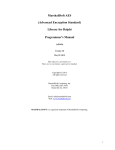
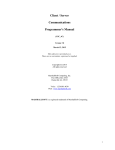

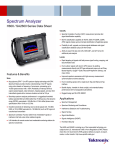
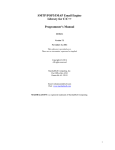
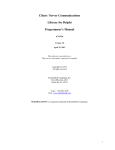
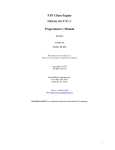
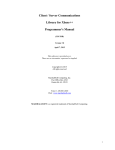

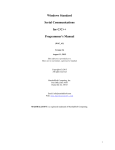


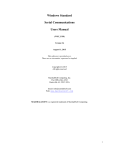
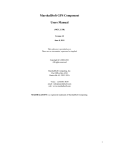



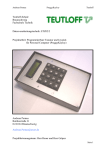
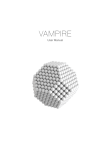
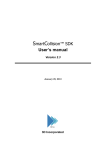
![the file [< 1 MB]](http://vs1.manualzilla.com/store/data/005663565_1-91d1e4bcdfd7b45b626a6b88ab809728-150x150.png)
